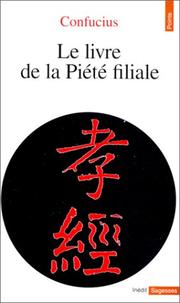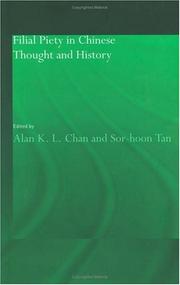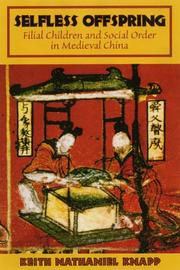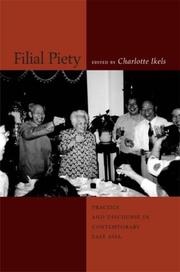| Listing 1 - 7 of 7 |
Sort by
|

ISBN: 2020313103 9782020313100 Year: 1998 Volume: 131 Publisher: Paris: Seuil,
Abstract | Keywords | Export | Availability | Bookmark
 Loading...
Loading...Choose an application
- Reference Manager
- EndNote
- RefWorks (Direct export to RefWorks)
Book
ISBN: 9782020989800 2020989808 Year: 2009 Publisher: Paris : Seuil,
Abstract | Keywords | Export | Availability | Bookmark
 Loading...
Loading...Choose an application
- Reference Manager
- EndNote
- RefWorks (Direct export to RefWorks)

ISBN: 0415333652 Year: 2004 Publisher: New York (N.Y.): RoutledgeCurzon
Abstract | Keywords | Export | Availability | Bookmark
 Loading...
Loading...Choose an application
- Reference Manager
- EndNote
- RefWorks (Direct export to RefWorks)
S12/0375 --- S12/0370 --- Filial piety --- -Conduct of life --- Ethics, Practical --- Morals --- Personal conduct --- Ethics --- Philosophical counseling --- Filial love --- Piety, Filial --- Conduct of life --- Parent and child --- Piety --- China: Philosophy and Classics--Filial piety --- China: Philosophy and Classics--Xiaojing 孝經 --- Conduct of life.
Book
ISBN: 9780824847609 Year: 2015 Publisher: Honolulu University of Hawaiʻi Press
Abstract | Keywords | Export | Availability | Bookmark
 Loading...
Loading...Choose an application
- Reference Manager
- EndNote
- RefWorks (Direct export to RefWorks)
S02/0300 --- S12/0375 --- S13A/0402 --- China: General works--Chinese culture and the West and vice-versa --- China: Philosophy and Classics--Filial piety --- China: Religion--Mythology (incl. pantheon, ghosts, myths and legends) --- Nezha (Chinese deity) --- Oedipus complex --- Tantric Buddhism --- In literature. --- Nezha (Chinese deity).

ISBN: 9780824828660 0824828666 Year: 2006 Publisher: Honolulu University of Hawaii press
Abstract | Keywords | Export | Availability | Bookmark
 Loading...
Loading...Choose an application
- Reference Manager
- EndNote
- RefWorks (Direct export to RefWorks)
Confucian ethics. --- Filial piety --- Parent and child --- Confucian ethics --- S11/0731 --- S12/0375 --- Child and parent --- Children and parents --- Parent-child relations --- Parents and children --- Children and adults --- Interpersonal relations --- Parental alienation syndrome --- Sandwich generation --- Religious ethics --- China: Social sciences--Childhood, youth --- China: Philosophy and Classics--Filial piety
Book
ISBN: 9781108974479 9781108838351 9781108978811 1108976085 1108974473 Year: 2022 Publisher: Cambridge Cambridge University Press
Abstract | Keywords | Export | Availability | Bookmark
 Loading...
Loading...Choose an application
- Reference Manager
- EndNote
- RefWorks (Direct export to RefWorks)
In Imperial China, the idea of filial piety not only shaped family relations but was also the official ideology by which Qing China was governed. In State and Family in China, Yue Du examines the relationship between politics and intergenerational family relations in China from the Qing period to 1949, focusing on changes in family law, parent-child relationships, and the changing nature of the Chinese state during this period. This book highlights how the Qing dynasty treated the state-sponsored parent-child hierarchy as the axis around which Chinese family and political power relations were constructed and maintained. It shows how following the fall of the Qing in 1911, reform of filial piety law in the Republic of China became the basis of state-directed family reform, playing a central role in China's transition from empire to nation-state.
Families --- Family policy --- Filial piety --- Filial love --- Piety, Filial --- Conduct of life --- Parent and child --- Piety --- Families and state --- State and families --- Public welfare --- Social security --- Social policy --- History --- Government policy --- S06/0205 --- S11/0700 --- S12/0375 --- China: Politics and government--Government and political institutions: Qing --- China: Social sciences--Clan and family: general and before 1949 (incl. names, clan rules) --- China: Philosophy and Classics--Filial piety --- E-books

ISBN: 0804747911 0804747903 Year: 2004 Publisher: Stanford (Calif.): Stanford university press
Abstract | Keywords | Export | Availability | Bookmark
 Loading...
Loading...Choose an application
- Reference Manager
- EndNote
- RefWorks (Direct export to RefWorks)
How have rapid industrial development and the aging of the population affected the expression of filial piety in East Asia? Eleven experienced fieldworkers take a fresh look at an old idea, analyzing contemporary behavior, not norms, among both rural and urban families in China, Japan, Korea, and Taiwan. Each chapter presents rich ethnographic data on how filial piety shapes the decisions and daily lives of adult children and their elderly parents. The authors' ability to speak the local languages and their long-term, direct contact with the villagers and city dwellers they studied lend an immediacy and authenticity lacking in more abstract treatments of the topic. This book is an ideal text for social science and humanities courses on East Asia because it focuses on shared cultural practices while analyzing the ways these practices vary with local circumstances of history, economics, social organization, and demography and with personal circumstances of income, gender, and family configuration.
S12/0375 --- S12/0370 --- Kinship --- -Family --- -Households --- Parent and adult child --- -Filial piety --- -Adult children of aging parents --- -Aging parents --- -Elderly parents --- Parents, Aged --- Parents --- Sandwich generation --- Aging parents' adult children --- Children of aging parents --- Aging parents --- Filial love --- Piety, Filial --- Conduct of life --- Parent and child --- Piety --- Adult child and parent --- Adult children and parents --- Parent-adult child relations --- Parents and adult children --- Adult children living with parents --- Population --- Families --- Home economics --- Family --- Family life --- Family relationships --- Family structure --- Relationships, Family --- Structure, Family --- Social institutions --- Birth order --- Domestic relations --- Home --- Households --- Marriage --- Matriarchy --- Parenthood --- Patriarchy --- Ethnology --- Clans --- Consanguinity --- Kin recognition --- China: Philosophy and Classics--Filial piety --- China: Philosophy and Classics--Xiaojing 孝經 --- Care --- -Social aspects --- Social conditions --- East Asia --- -Asia, East --- Asia, Eastern --- East (Far East) --- Eastern Asia --- Far East --- Orient --- Social life and customs --- Adult children of aging parents --- Filial piety --- Social life and customs. --- Social aspects --- Asia, East
| Listing 1 - 7 of 7 |
Sort by
|

 Search
Search Feedback
Feedback About UniCat
About UniCat  Help
Help News
News